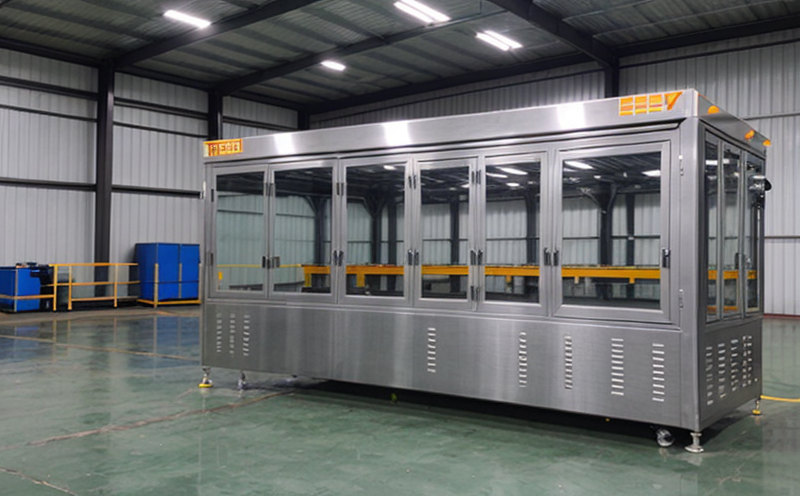ASTM E8 Tensile Testing of Metal Cans
The ASTM E8 tensile testing method is a critical quality control tool used in the packaging industry to evaluate the mechanical properties of metallic materials, particularly metal cans. This test assesses the tensile strength and elongation capabilities of the metallic material used in can construction. For quality managers and compliance officers, understanding this test ensures that products meet the necessary safety standards and performance expectations.
The ASTM E8 standard provides a robust framework for conducting tensile tests on metallic materials to determine their mechanical integrity. This is particularly important for metal packaging as it directly impacts the product's shelf life, resistance to environmental factors such as moisture or temperature fluctuations, and overall consumer safety. Compliance officers must ensure that every batch of metal cans meets these stringent standards.
For R&D engineers, this test plays a crucial role in optimizing can design and material selection. By understanding how different materials behave under stress, they can enhance the performance and longevity of their products. Similarly, procurement teams rely on this test to select suppliers who provide high-quality metal cans that adhere to international standards.
The tensile testing process involves cutting specimens from the metal cans following specified dimensions outlined in ASTM E8. These specimens are then placed into a universal testing machine where they undergo controlled stretching until failure occurs. The peak load at which fracture happens defines the tensile strength of the material, while the distance between the gauge marks on the specimen divided by their initial length indicates the elongation.
The accuracy and precision of these measurements significantly influence product quality and consumer satisfaction. Inaccurate readings could lead to substandard products that do not meet regulatory requirements or fail during use, potentially causing damage to contents inside the cans. Therefore, ensuring proper sample preparation according to ASTM E8 guidelines is essential for obtaining reliable results.
Additionally, this test helps in identifying any flaws within the metal structure which might compromise its integrity over time. Engineers can utilize this information to refine manufacturing processes and improve overall product reliability.
Scope and Methodology
| Parameter | Description |
|---|---|
| Test Specimens | Cylindrical samples cut from the metal can body, typically 10-35 mm in diameter and 25-75 mm long. |
| Test Machine | A universal testing machine capable of applying controlled tensile forces up to 1 MN (mega-newton). |
| Testing Environment | Controlled environment with temperature and humidity levels maintained close to room conditions unless specified otherwise. |
| Load Cell Accuracy | Accuracy within ±1% for loads exceeding 2 kN (kilo-newton). |
| Gauge Length | The distance between the gauge marks on the specimen should be at least five times the thickness of the material. |
| Data Recording | All data points including load, displacement, and strain must be recorded continuously throughout testing. |
The ASTM E8 standard specifies detailed procedures for conducting tensile tests on metallic specimens. It ensures that all laboratories performing this test follow consistent protocols, thereby producing comparable results across different facilities worldwide. By adhering to these rigorous specifications, manufacturers can maintain high standards of quality control and compliance with industry regulations.
Why Choose This Test
The ASTM E8 tensile test is an indispensable tool for ensuring the mechanical integrity of metal packaging materials. It allows manufacturers to assess critical properties like tensile strength, yield point, and elongation percentage. These attributes are vital in determining how well a can will withstand various storage conditions without compromising its structural soundness.
For quality managers, choosing ASTM E8 ensures consistent performance across all batches produced by the company. This consistency is crucial for maintaining brand reputation and customer trust. Compliance officers benefit from this test because it provides clear evidence that products adhere to relevant safety standards and regulations.
R&D engineers gain valuable insights into material behavior under stress, which can drive innovation in product design and development. They can experiment with different alloys or coatings without risking significant financial losses if initial trials fail due to poor quality materials.
Moreover, this test offers a competitive advantage by enabling companies to produce superior products that outperform competitors' offerings. In today’s highly competitive market, being able to demonstrate adherence to international standards like ASTM E8 can set your company apart from others in the same industry.
The tensile testing method also contributes positively towards sustainable practices within the packaging sector. By selecting robust materials through rigorous testing procedures, manufacturers reduce waste and improve resource efficiency throughout their supply chain processes.
Competitive Advantage and Market Impact
The ability to accurately measure tensile properties of metal cans using ASTM E8 provides significant competitive advantages for packaging companies. It enables them to produce more reliable and durable products, which in turn enhances customer satisfaction and loyalty. Consumers today are increasingly concerned about product safety and environmental impact, so offering high-quality packaging that meets these expectations can attract a wider customer base.
Compliance with ASTM E8 also opens up new market opportunities for companies seeking to expand globally. Many countries have their own national standards but often align closely with internationally recognized ones like those published by ASTM or ISO. By adhering strictly to ASTM E8 guidelines, manufacturers ensure that their products meet these higher benchmarks, making them more attractive to international buyers.
From a technological perspective, the insights gained from this testing method can lead to advancements in materials science and engineering practices within the packaging industry. Continuous improvement based on test results helps drive innovation towards creating lighter yet stronger cans, improving energy efficiency during production processes, reducing material usage without sacrificing quality, among other benefits.
Overall, implementing ASTM E8 tensile testing not only strengthens a company's position in the current market but also positions it for future growth as consumer expectations evolve and new challenges arise. The robust data generated through this process provides valuable input into decision-making processes related to product development, cost management, and environmental sustainability strategies.





